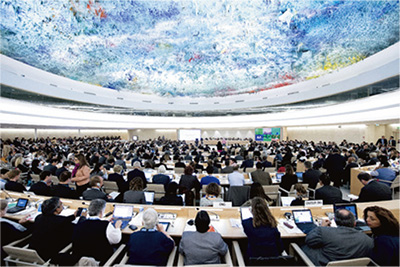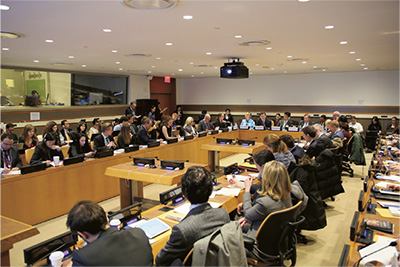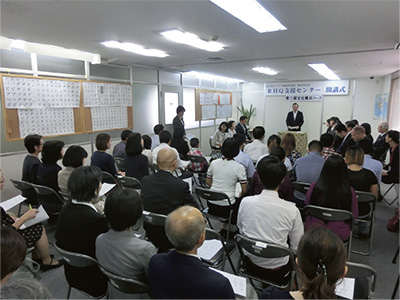Diplomatic Bluebook 2017
Chapter 3
Japan's Foreign Policy to Promote National and Worldwide Interests
7.Human Rights
(1) Initiatives within the UN
A UN Human Rights Council
The UN Human Rights Council was established in 2006 as a restructured version of the Human Rights Committee, in order to strengthen the UN's ability to address human rights issues, as part of a movement toward mainstreaming human rights in the UN. The Human Rights Council holds sessions throughout the year in Geneva (three regular sessions per year, lasting at least ten weeks in total), to discuss issues and make recommendations concerning the protection and promotion of human rights and fundamental freedoms.
At the high-level segment of the 31st Session held in March, Parliamentary Vice-Minister for Foreign Affairs Masakazu Hamachi delivered a statement. He expressed concern for the human rights situations in Syria and North Korea, and spoke about various changes in the human rights situations in countries around the world, as well as the position of the Government of Japan. He also introduced examples of the assistance that Japan has implemented to date, including support for the rebuilding of societies so that they do not give rise to extremism, support for refugees, and cooperation with the UN Human Rights Council.
 UN Human Rights Council (Photo: UN photo/Jean-Marc Ferre)
UN Human Rights Council (Photo: UN photo/Jean-Marc Ferre) Scene of panel discussion on the human rights situation in North Korea (December 1, New York, U.S. (UN Headquarters))
Scene of panel discussion on the human rights situation in North Korea (December 1, New York, U.S. (UN Headquarters))During the same Session, the Resolution on the Situation of Human Rights in the Democratic People's Republic of Korea (DPRK), co-tabled by Japan and the European Union (EU), was adopted without a vote (adopted for nine consecutive years). This resolution condemns in the strongest terms North Korea's ongoing systematic, widespread and gross human rights violations. In addition, it welcomes the decision of the UN Security Council to hold a Council meeting, during which the situation of human rights in North Korea was discussed and looks forward to the continued and active engagement of the UN Security Council on this matter. Furthermore, it also requests the UN High Commissioner for Human Rights to designate the independent experts to focus on issues of accountability for human rights violations in North Korea and also requests the experts to recommend practical mechanisms of accountability to secure truth and justice for the victims of possible crimes against humanity in North Korea.
At the UN General Assembly held in New York in October, an election was held for the membership of the UN Human Rights Council. Japan was elected as a member state during the first round of voting. As a result of this election, Japan will serve as one of the members of the UN Human Rights Council for a three-year term starting from January 1, 2017.
Japan will continue to be actively engaged in discussions in the UN Human Rights Council to resolve human rights issues in the international community.
B The Third Committee of the UN General Assembly
The Third Committee of the UN General Assembly is, along with the Human Rights Council, the UN's main forum focused on human rights. In October and November, the Committee discusses a wide range of issues, including social development, women, children, racial discrimination, refugees, crime prevention, and criminal justice, as well as the human rights situations in North Korea, Syria, and Iran, among others. Resolutions adopted by the Third Committee are submitted to a plenary session of the General Assembly, contributing to the development of international norms.
Every year, since 2005, Japan and the EU have co-tabled the Resolution on the Situation of Human Rights in North Korea at the UN General Assembly. In 2016, Japan and the EU again co-tabled the resolution at the Third Committee of the 71st session of the General Assembly, which was adopted without a vote at the Third Committee in November and the plenary session in December (adopted for the 12th time, for 12 consecutive years). The resolution is stronger than that of last year in its content, which is based on the previous year's UN General Assembly resolution reflecting the final report of the Commission of Inquiry on Human Rights in the DPRK (COI), and on the Human Rights Council resolution of March. Specifically, along with the condemnation of North Korea's systematic, widespread and gross human rights violations, it urges North Korea to urgently take measures to end all human rights violations, including the immediate return of all abductees. In addition, it expresses grave concern about the impact of North Korea's diverting of resources to advance nuclear weapons and ballistic missiles programs on the humanitarian and human rights situation in North Korea. Furthermore, it also encourages the UN Security Council to take appropriate actions, including through consideration of referral of the situation in North Korea to the International Criminal Court (ICC) and consideration of the further development of sanctions in order to target effectively those who appear to be most responsible for human rights violations.
On December 1, a panel discussion entitled “The Situation of Human Rights in the Democratic People's Republic of Korea (DPRK) – Current Situation and Initiatives by the International Community” was held at the UN Headquarters, co-sponsored by Japan, Australia, the EU, the ROK, and the United States of America. Katsunobu Kato, Minister in charge of the Abduction Issue, represented the Government of Japan as a panelist and appealed to the international community the gravity of the abductions issue and the urgency of rescuing the abductees facing the fact that the abductees and their family members are aging. During the event, there was an active discussion about the international coordination toward improving the human rights situation in North Korea, including realizing the return of all abductees at the earliest possible date.
In addition, Japan also actively participated in discussions on the human rights situations in individual countries, such as Syria, Iran, and Myanmar, as well as discussions on various human rights issues (social development and the rights of the child etc.). Japan participated actively in discussions in the international community toward protecting and promoting human rights, in cooperation with civil society, such as by dispatching a female representative of a Japanese NGO to serve as the Alternate Representative of Japan at the Third Committee of the 71st session of the UN General Assembly, as it has done previously.
(2) Initiatives Concerning International Human Rights Law and International Humanitarian Law
A International Human Rights Law
In June, at the 16th Meeting of States Parties to the Convention on the Rights of the Child, an election for the members of the Committee on the Rights of Child was held. Mikiko Otani (lawyer), the candidate nominated by Japan, was elected as the first Japanese candidate. Furthermore, at the 9th Session of the Conference of State Parties to the Convention on the Rights of Persons with Disabilities (CRPD) held in June, an election for the members of the Committee was held. Jun Ishikawa (Professor, University of Shizuoka), the candidate nominated by Japan, was elected as the first Japanese candidate.
The Government's periodic reports on the status of the implementation of the various human rights conventions that Japan has concluded are carefully and seriously examined, with reference to the provisions of the relevant conventions. In June, the Government submitted its initial State Party's report of CRPD to the Committee on the Rights of Persons with Disabilities. Japan also submitted its first Government Report concerning the International Convention for the Protection of All Persons from Enforced Disappearance to the Committee on Enforced Disappearances in July. Furthermore, in March, June, and December, the Government submitted to the Human Rights Committee the additional information and comments in response to the request of the Committee for relevant information on the implementation of the specific recommendations made in the concluding observations of the Committee on the sixth Periodic Report of Japan. In August and December, the Government submitted additional information on Japan's initiatives in response to the request of the Committee on the Elimination of Racial Discrimination for information on the recommendations made in the concluding observations of the Committee for the seventh, eighth, and ninth Combined Periodic Reports concerning the International Convention on the Elimination of All Forms of Racial Discrimination submitted by the Government.
B International Humanitarian Law
Japan participated actively in discussions held in Geneva on strengthening the International Humanitarian Law, which seek to strengthen the implementation of the International Humanitarian Law and to protect those who have been deprived of their liberty. At the diplomatic meeting of States Parties of the International Humanitarian Fact-Finding Commission (IHFFC) held in Switzerland in December, an election was held to select members of the IHFFC. Shuichi Furuya (Professor, Waseda University), the candidate nominated by Japan, was re-elected. Moreover, as part of its efforts to promote awareness and understanding of International Humanitarian Law, MOFA dispatched a lecturer to the International Humanitarian Law Moot Court Competition hosted by the International Committee of the Red Cross (ICRC), as it did in 2015.
(3) Initiatives Undertaken via Bilateral Dialogue
In addition to initiatives within the UN and other multilateral frameworks, Japan recognizes the importance of bilateral dialogues, in order to protect and promote human rights. The 11th Japan-Iran Human Rights Dialogue was held in February (in Tehran), and the 22nd Japan-EU Human Rights Dialogue was held in July (in Tokyo). In addition to exchanging information on their respective initiatives in the field of human rights, the participants in these dialogues exchanged opinions concerning cooperation in multilateral fora such as the UN.
(4) Contribution to Refugees Issues
From the perspective of international contribution and humanitarian aid, Japan started accepting refugees from Myanmar who were temporarily residing in Thailand, under a resettlement program that ran from FY2010 to FY2014 (which is defined as the transfer of refugees from the country in which they have sought protection to a third country that agrees to accept them).
In addition to accepting refugees from Myanmar who were residing temporarily in Malaysia since FY2015, Japan also welcomes the eligible relatives of those who are already resettled in Japan, based on the premise of mutual aid with Thailand. Since FY2010, 123 people from 31 families have come to Japan under this program.
Until now, the main destinations for refugees to be accepted for resettlement have been Western countries, and Japan is the first Asian country to accept resettled refugees. Accordingly, Japan has attracted both high praise and high hopes from the international community in regard to its proactive efforts to address refugee issues. Amid a recent increase in the number of applicants seeking refugee status in Japan, Japan is continuing its efforts to provide finely tuned support to those who truly need it.
 Scene of ceremony to mark the start of Japan's Resettlement Project for refugees (October 6. Photo: Refugee Assistance Headquarters)
Scene of ceremony to mark the start of Japan's Resettlement Project for refugees (October 6. Photo: Refugee Assistance Headquarters)